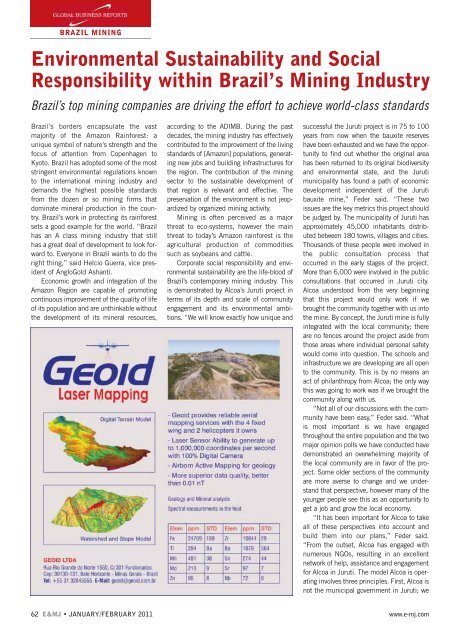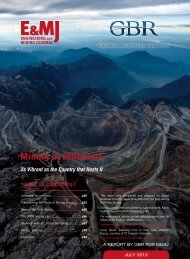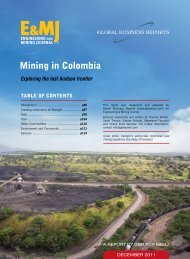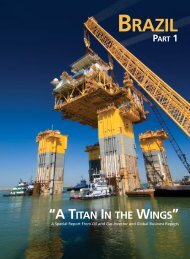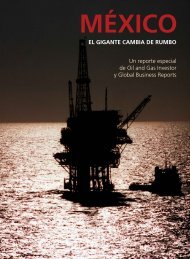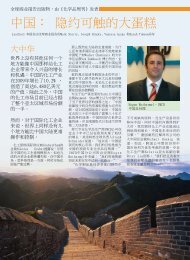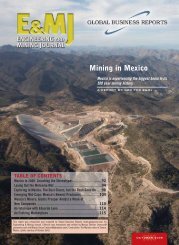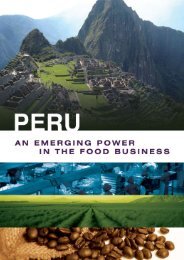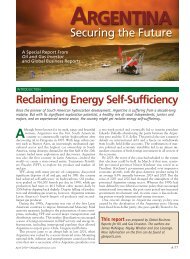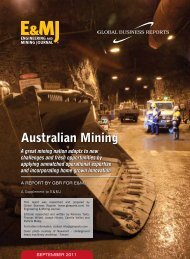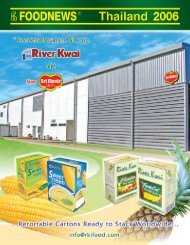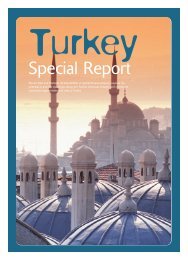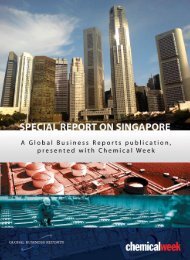Brazil Mining 2011 - GBR
Brazil Mining 2011 - GBR
Brazil Mining 2011 - GBR
Create successful ePaper yourself
Turn your PDF publications into a flip-book with our unique Google optimized e-Paper software.
BRAZIL MINING<br />
Environmental Sustainability and Social<br />
Responsibility within <strong>Brazil</strong>’s <strong>Mining</strong> Industry<br />
<strong>Brazil</strong>’s top mining companies are driving the effort to achieve world-class standards<br />
<strong>Brazil</strong>’s borders encapsulate the vast<br />
majority of the Amazon Rainforest: a<br />
unique symbol of nature’s strength and the<br />
focus of attention from Copenhagen to<br />
Kyoto. <strong>Brazil</strong> has adopted some of the most<br />
stringent environmental regulations known<br />
to the international mining industry and<br />
demands the highest possible standards<br />
from the dozen or so mining firms that<br />
dominate mineral production in the country.<br />
<strong>Brazil</strong>’s work in protecting its rainforest<br />
sets a good example for the world. “<strong>Brazil</strong><br />
has an A class mining industry that still<br />
has a great deal of development to look forward<br />
to. Everyone in <strong>Brazil</strong> wants to do the<br />
right thing,” said Helcio Guerra, vice president<br />
of AngloGold Ashanti.<br />
Economic growth and integration of the<br />
Amazon Region are capable of promoting<br />
continuous improvement of the quality of life<br />
of its population and are unthinkable without<br />
the development of its mineral resources,<br />
according to the ADIMB. During the past<br />
decades, the mining industry has effectively<br />
contributed to the improvement of the living<br />
standards of [Amazon] populations, generating<br />
new jobs and building infrastructures for<br />
the region. The contribution of the mining<br />
sector to the sustainable development of<br />
that region is relevant and effective. The<br />
preservation of the environment is not jeopardized<br />
by organized mining activity.<br />
<strong>Mining</strong> is often perceived as a major<br />
threat to eco-systems, however the main<br />
threat to today’s Amazon rainforest is the<br />
agricultural production of commodities<br />
such as soybeans and cattle.<br />
Corporate social responsibility and environmental<br />
sustainability are the life-blood of<br />
<strong>Brazil</strong>’s contemporary mining industry. This<br />
is demonstrated by Alcoa’s Juruti project in<br />
terms of its depth and scale of community<br />
engagement and its environmental ambitions.<br />
“We will know exactly how unique and<br />
successful the Juruti project is in 75 to 100<br />
years from now when the bauxite reserves<br />
have been exhausted and we have the opportunity<br />
to find out whether the original area<br />
has been returned to its original biodiversity<br />
and environmental state, and the Juruti<br />
municipality has found a path of economic<br />
development independent of the Juruti<br />
bauxite mine,” Feder said. “These two<br />
issues are the key metrics this project should<br />
be judged by. The municipality of Juruti has<br />
approximately 45,000 inhabitants distributed<br />
between 180 towns, villages and cities.<br />
Thousands of these people were involved in<br />
the public consultation process that<br />
occurred in the early stages of the project.<br />
More than 6,000 were involved in the public<br />
consultations that occurred in Juruti city.<br />
Alcoa understood from the very beginning<br />
that this project would only work if we<br />
brought the community together with us into<br />
the mine. By concept, the Juruti mine is fully<br />
integrated with the local community; there<br />
are no fences around the project aside from<br />
those areas where individual personal safety<br />
would come into question. The schools and<br />
infrastructure we are developing are all open<br />
to the community. This is by no means an<br />
act of philanthropy from Alcoa; the only way<br />
this was going to work was if we brought the<br />
community along with us.<br />
“Not all of our discussions with the community<br />
have been easy,” Feder said. “What<br />
is most important is we have engaged<br />
throughout the entire population and the two<br />
major opinion polls we have conducted have<br />
demonstrated an overwhelming majority of<br />
the local community are in favor of the project.<br />
Some older sections of the community<br />
are more averse to change and we understand<br />
that perspective, however many of the<br />
younger people see this as an opportunity to<br />
get a job and grow the local economy.<br />
“It has been important for Alcoa to take<br />
all of these perspectives into account and<br />
build them into our plans,” Feder said.<br />
“From the outset, Alcoa has engaged with<br />
numerous NGOs, resulting in an excellent<br />
network of help, assistance and engagement<br />
for Alcoa in Juruti. The model Alcoa is operating<br />
involves three principles. First, Alcoa is<br />
not the municipal government in Juruti; we<br />
62 E&MJ • JANUARY/FEBRUARY <strong>2011</strong> www.e-mj.com


